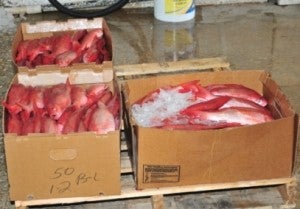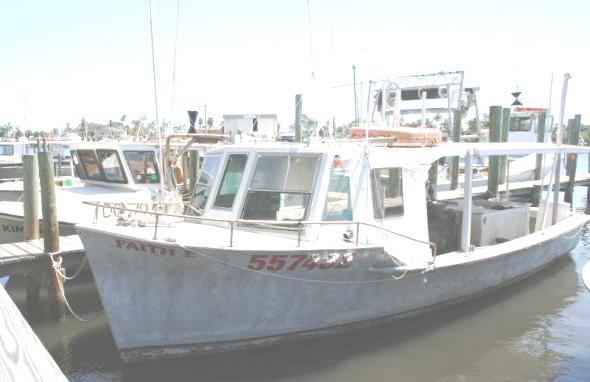Progress made toward catch shares, which will end derbies and provide year-round fishing
 The latest South Atlantic Fishery Management Council (SAFMC) meeting resulted in several positive outcomes for fisheries and fishermen, notably the unanimous votes to add details to the snapper grouper and golden crab catch share programs and seek public input on them in early 2011.
The latest South Atlantic Fishery Management Council (SAFMC) meeting resulted in several positive outcomes for fisheries and fishermen, notably the unanimous votes to add details to the snapper grouper and golden crab catch share programs and seek public input on them in early 2011.
Dangerous derby a reminder of need for catch shares
At the same time the Council met, a dangerous year-end black sea bass fishing derby kept many fishermen away from the meeting and served as a reminder of why improving management is urgently needed.
The black sea bass fishery was opened for a short end-of-year season Dec. 1-15. With vermillion snapper off limits, fishermen rushed to catch black sea bass, even in bad weather, to catch as many black sea bass as possible before the season closes. As these fish glut the market, prices stand to drop significantly.
Dangerous fishing derbies like this one are becoming more prevalent as fishing seasons are drastically shortened throughout the region.
Fishermen and communities are struggling as fishermen and fish dealers go out of business. Catch shares are a proven solution to rebuild prosperous fisheries and communities. Catch shares also eliminate destructive derby conditions.
The SAFMC should move aggressively to gather fishermen input on catch share design and feedback on the pending catch share amendments.
Catch shares improve the safety of fishing
Below are examples where catch shares improved the safety of fishing.
| httpv://www.youtube.com/watch?v=gBbCH77xKW0 | |
| Alaskan fishermen talk about improved safety under catch shares in this video from Marine Conservation Alliance. |
- Five years after catch shares were implemented, ten U.S. and British Columbian commercial fisheries saw an average 2.5 fold increase in safety, as measured by lost vessels, search and rescue missions, injuries, deaths and safety violations.
- The number of search and rescue missions for Alaska’s halibut and sablefish fishermen declined after catch shares were implemented from 26 and 33 in 1993 and 1994 respectively (pre-catch shares) to just 5 cases in 2007 and 3 in 2008 (under catch shares). More than 85 percent of Alaska halibut fishermen surveyed found fishing to be safer under catch shares.
- The Anchorage Daily News’ story “Deadliest Catch? Salmon, Not Crab” reviews statistics about where fishing fatalities are the worst. It turns out crab in the Bering Sea is not the deadliest catch. That fishery claimed the lives of 12 crabbers since 2000, while other fisheries saw many more deaths [Gulf of Mexico shrimp (55), Atlantic scallop (44) and Alaska salmon (39)]. The author says the Bering Sea crabbers attribute the increased safety to the shift to catch share management in 2005. She explains that only one life has been lost since 2005, compared to 77 deaths between 1991 and 2005.
Fishing derbies are brewing in the Southeast. Fishery managers should act responsibly for fish and fishermen, including taking steps to reduce derby fishing conditions with catch shares.

 Today in Orlando, Florida, the South Atlantic Fishery Management Council (Council) approved amendment 17A (17A) to the snapper grouper fishery management plan. Now it will go to U.S. Secretary of Commerce Gary Locke for approval. 17A closes the red snapper fishing season throughout the Southeast. It also closes a 5,000 square mile area for additional kinds of snapper and grouper fishing from Georgia to South Florida. A short-term ban was put in place in January to prevent red
Today in Orlando, Florida, the South Atlantic Fishery Management Council (Council) approved amendment 17A (17A) to the snapper grouper fishery management plan. Now it will go to U.S. Secretary of Commerce Gary Locke for approval. 17A closes the red snapper fishing season throughout the Southeast. It also closes a 5,000 square mile area for additional kinds of snapper and grouper fishing from Georgia to South Florida. A short-term ban was put in place in January to prevent red  Southeast fishermen recently finished the first month of closures on many popular fish. Many fisheries won’t open again for several months and reality is sinking in across the region.
Southeast fishermen recently finished the first month of closures on many popular fish. Many fisheries won’t open again for several months and reality is sinking in across the region.